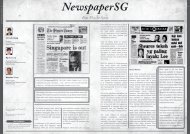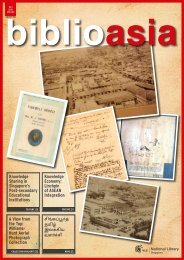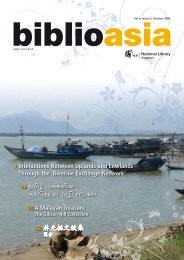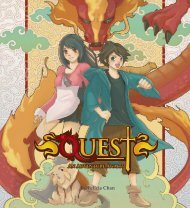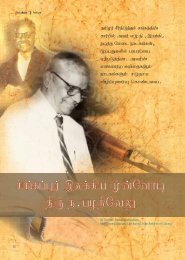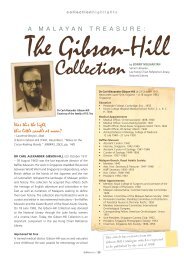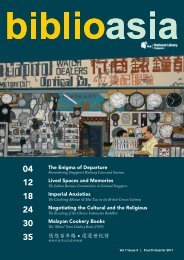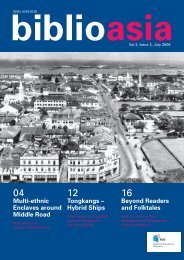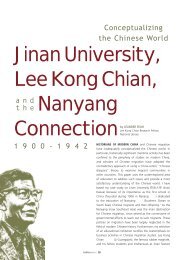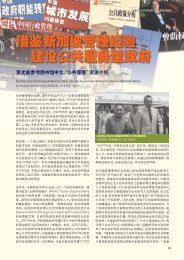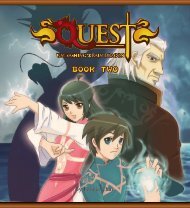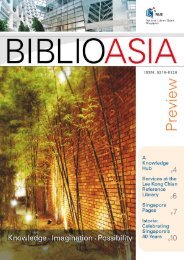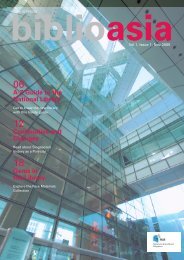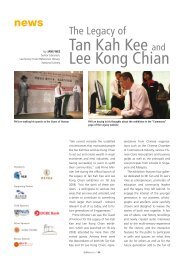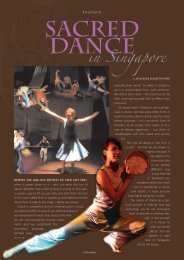éå°å¹³ä¸ æ°å å¡ç»éª - National Library Singapore
éå°å¹³ä¸ æ°å å¡ç»éª - National Library Singapore
éå°å¹³ä¸ æ°å å¡ç»éª - National Library Singapore
You also want an ePaper? Increase the reach of your titles
YUMPU automatically turns print PDFs into web optimized ePapers that Google loves.
NEWS<br />
Heritage Road Show IV<br />
Commemorates 50 Years of<br />
<strong>Singapore</strong>’s Self-governance<br />
by Nurulhuda Binte Subahan<br />
Associate l<br />
Programmes & Exhibitions<br />
<strong>National</strong> <strong>Library</strong> Board<br />
The many adversities in our lives, the day-today<br />
challenges that we face, are most often,<br />
unknowingly the source of our strengths. We<br />
draw courage from learning how to handle<br />
our fears. We build wisdom from the lessons<br />
that life has to give and the mistakes that we<br />
make. Life’s curve balls may shake us with<br />
disappointments. Ironically, these setbacks<br />
can surprisingly pave for us the way to success.<br />
The former President of South Africa, Nelson Mandela, was<br />
imprisoned 27 years for the anti-apartheid cause that he believed<br />
in before his nation-building efforts towards the implementation<br />
of multi-racial democracy in South Africa was eventually<br />
recognised.<br />
<strong>Singapore</strong>an merchant and philanthropist Tan Tock Seng,<br />
originally from Malacca, relocated to <strong>Singapore</strong> after which he<br />
became a successful businessman. He contributed his wealth to the<br />
construction of Tan Tock Seng Hospital. Today, the hospital is still<br />
standing strong and serving the needs of the nation’s population.<br />
Fighting for the right to live became a main mission in life when<br />
<strong>Singapore</strong> was faced with the grim situation of war during the<br />
Japanese Occupation from 1942 to 1945. The difficulty of getting<br />
sufficient food supply forced many to rely on tapioca plants for<br />
their main source of carbohydrate while religious buildings like<br />
mosques, churches and synagogues became a refuge from the<br />
brutality of bombings. Needless to say, the situation at that time<br />
forced the multi-ethnic society of <strong>Singapore</strong> to come together to<br />
battle not only the Japanese but also our former colonial masters,<br />
the British. By coming to terms with our own identity as unique<br />
citizens of <strong>Singapore</strong>, we achieved the right to self-government in<br />
1959 before gaining full independence in 1965.<br />
Our forefathers journeyed across the oceans and continents<br />
with a dream of building a better future in a faraway island that<br />
they barely knew — an island that is now known as <strong>Singapore</strong>.<br />
Today, this “faraway island” that they had set their eyes on<br />
remains as a small dot on the world map, equally vulnerable and<br />
fragile. However, this small island has weathered the storms of<br />
global recession, Severe Acute Respiratory Syndrome (SARS),<br />
terrorism, bird flu and recently, the H1N1 flu virus and the<br />
economic recession. Still, it’s too early to tell if there are many<br />
more that this small nation has to face in the future.<br />
While weathering the unpredictable global economic climate,<br />
it is sometimes important and helpful for us to look inwards and<br />
trace back our sources of strength and inspiration to help us pull<br />
through the tough times.<br />
The nation-building stories of this small nation started in 1959<br />
when granted self-government by the British and the story of our<br />
success continues till today.<br />
There are many more inspiring stories that we can draw from<br />
the unsung heroes of <strong>Singapore</strong>. Stories of courage and the<br />
memories that people hold on to, while being part of significant<br />
nation-building efforts make <strong>Singapore</strong>’s unique history pieced<br />
together. This includes memories of establishing <strong>Singapore</strong>’s<br />
<strong>National</strong> <strong>Library</strong> to what it is today. Once, due to lack of funds,<br />
Mrs Hedwig Anuar who was director of the <strong>National</strong> <strong>Library</strong> from<br />
1965 to 1988, recalls having to mobilise 50 library staff to form<br />
a human chain to transfer the books when the <strong>National</strong> <strong>Library</strong><br />
was being relocated.<br />
This year’s Heritage Road Show traces the journey of<br />
<strong>Singapore</strong>’s history from 1959 till 2009 based on the personal<br />
recollections of <strong>Singapore</strong> memories that the man in the street<br />
has to share.<br />
Our national anthem “Majulah Singapura”, which means<br />
“Onward <strong>Singapore</strong>” when translated to English, was selected as<br />
the nation’s anthem when <strong>Singapore</strong> attained self-government<br />
in 1959. Symbolising <strong>Singapore</strong>’s rootedness to our identity,<br />
the same anthem has been sung for 50 years from 1959 till<br />
today, with tune and lyrics remaining unchanged in spite of the<br />
progress that <strong>Singapore</strong> has made through the years.<br />
Perhaps, to reflect back, we ought to remind ourselves of<br />
our aspirations from the translated lyrics of our anthem and<br />
help us recall those personal stories that we can share at this<br />
year’s road show.<br />
Come, fellow <strong>Singapore</strong>ans<br />
Let us progress towards happiness together<br />
May our noble aspiration bring<br />
<strong>Singapore</strong> success<br />
Come, let us unite<br />
In a new spirit<br />
Let our voices soar as one<br />
Onward <strong>Singapore</strong><br />
(Excerpts from “Majulah Singapura”)<br />
40



